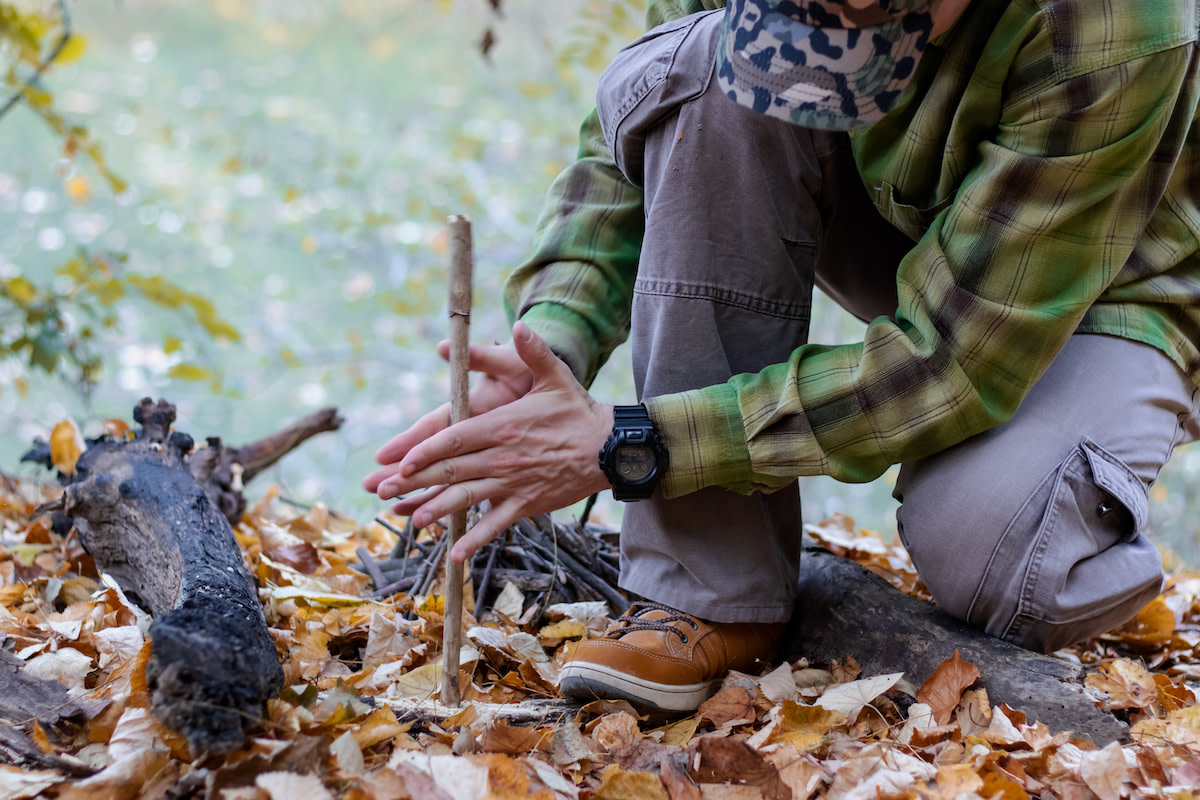Survival Skills: 7 Wilderness Survival Skills to Learn
Written by MasterClass
Last updated: May 27, 2022 • 4 min read
Learning basic survival skills—like first aid, building different types of shelters, and foraging for wild plants—will help you safely make it back to camp (or civilization) on a wilderness trip. Whether you’re a backpacker, a catastrophe prepper, or a simple day hiker, this list of skills will come in handy if you find yourself in a wilderness survival situation.
Learn From the Best
About Survival Camping Skills
If you’re venturing outside for an extended period of time, take a moment to apprise yourself of certain basic outdoor survival skills (like foraging for food, starting a fire, or building shelter). These skills can increase your chances of survival if you’re stuck in the remote backcountry.
Before venturing out on a survival camping trip, keep the hierarchy of basic human needs in mind. Building shelter is the most important thing, then water and food. Always let the people in your life know when you’re heading out and when you plan to return. If there is an emergency, a search and rescue team will be able to find your location with the directions provided by your loved ones. (You can also build a signal fire to call for help if you get lost.)
7 Essential Survival Skills
Here are some basic survival skills to develop before embarking on an extended wilderness camping trip.
- 1. Building shelter: Building a survival shelter (if you don’t have a tent) is the most important thing to prioritize in a survival situation. Erecting a small makeshift shelter can protect you from predatory wild animals and regulates your body temperature when it gets cold at night. The simplest type of shelter to build is a basic lean-to shelter—a structure made of wooden stakes, rope, and a form of roofing (often a tarp or a poncho) leaning against a tree, rock, or existing support structure. If there’s some snowfall on the ground, use it to build a snow shelter to protect yourself from below-freezing winter temperatures.
- 2. Finding food: People on long camping or wilderness expeditions may depend on foraging for medicinal or edible plants or killing wild game for survival. Some common food sources to forage include cattails, acorns and stinging nettles (if boiled), tubers, rosehips, weeds, yarrow, and plantains. Some edible wild berries are safe to eat, but others are toxic. Before you forage, make sure that you know how to properly do so because eating the wrong plants can be harmful.
- 3. Fire-starting: Before embarking on a camping or backpacking trip, it’s important to learn how to start a fire because it will enable you to cook food, maintain body heat in cold temperatures, and boil water to purify it for drinking. To make a fire, you’ll need matches or lighters, kindling, firewood, and tinder, like pine needles, a tree branch or two, and pinecones. Bring along a fire extinguisher for safety, and always keep an eye on the fire you create.
- 4. First aid: Survival camping is largely about preparing for the worst-case scenario. In advance of your camping trip, take a first-aid class to learn how to care for yourself if you get injured or sick. Learn how to use tourniquets, dress wounds, and set broken bones.
- 5. Navigation: Knowing how to navigate without technology is one of the most important survival skills you can have on an extended backcountry expedition. Using a compass (which helps navigators determine where north, south, east, and west are) and a map together is one of the most precise ways to find your way back to camp on extended day hikes. It’s also possible to use an analog wristwatch, the sun, or static electricity to navigate back to your campsite in a pinch. Learn more about how to navigate.
- 6. Packing: When you venture into the wilderness for an extended period, packing light while still including essential survival gear can save your life. Build a survival kit with the most important gear, including a compass (or map), sleeping bag, water filter, knife, fire starter, first-aid kit, water filtration device, and purification tablets (like iodine tablets). Have your phone on hand just in case you encounter an emergency situation and have to call 911.
- 7. Purifying water: Wild water sources often contain harmful viruses and pathogens that could cause waterborne illnesses. You’ll always need to purify water in the wild to keep yourself hydrated, which is necessary for your survival. Always filter your drinking water before consuming it to remove any errant debris that could cause illnesses.
Preparing for Wilderness Expeditions
Certain outdoor activities carry an elevated risk of serious injury. Wilderness scenarios require extensive survival gear, including but not limited to food, water, maps, protective clothing, and first aid, along with mental and physical fortitude. This article is for educational and informational purposes and is not a substitute for hard skills and expertise.
Ready to Explore More of the Great Outdoors?
Prepare for any outdoor journey by grabbing a MasterClass Annual Membership and committing Jessie Krebs’s wilderness survival course to memory. As a former United States Air Force Survival, Evasion, Resistance, and Escape instructor, Jessie can teach you everything you need to know about packing for a trip (neon is the new black), purifying water, foraging (crickets: the other white meat), starting a fire, and signaling for help (forget SOS).
